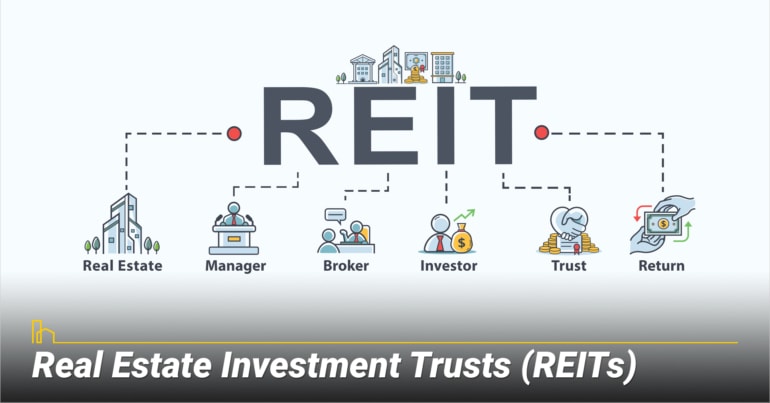3 Ways to Invest in Real Estate Without Becoming a Landlord
- Author:by The HOMEiA Team
- Category: Real Estate Investing

The real estate market can be lucrative. Perhaps you’ve considered investing in real estate: buying a property and renting it out, watching those checks come in each month to cover your mortgage payment and expenses with some profit left over, and eventually building wealth as your equity grows.
It sounds like a perfect plan… if only humans weren’t involved. Renters can fail to pay you on time, damage your property and call you with plumbing issues in the middle of the night.
It can get worse than bad tenants, though. How about no tenants at all? If you can’t rent out the unit, you’re still stuck paying the bills, but without the income to offset them.
Maybe being a landlord is just not for you. But before you walk away from the real estate sector altogether, you should know that you have other options.
That’s right; you can invest in real estate without the headaches. It’s called passive investing.
Recommended for you
What is passive real estate investing?
A simple definition comes from Matthew Frankel at The Motley Fool: “Passive real estate investing is when you give someone your money and they do all the work for you.”
If that sounds too good to be true, make sure you’re not skipping over the “you give someone your money” part. Like most investments, real estate investing requires you to give up the money you have now in hopes of getting more back later. And, in general, the higher the potential rewards, the bigger the risk.
To understand the types of investment that are available to you, it may help to review some of the roles in the real estate game.
- a) Developers buy vacant land or properties in need of renovation and oversee construction or renovation projects. They expect to profit when they sell or rent out the properties.
- b) Lenders determine whether borrowers are creditworthy, lend out the money necessary for a real estate transaction and collect ongoing payments and interest.
- c) Real estate agents are hired to unite the right buyer with the right property. They are typically paid a commission on the sale.
- d) Landlords own properties and make money by renting them out.
- e) Sellers own properties and make money when they sell them for more than they paid.
- f) Tenants pay for the right to occupy the property.
- g) Buyers pay for ownership of the property.
Any time one party needs money now in order to profit in the future, there is an opportunity for investment.
Now let’s explore three ways that you can buy into the market and let your money do the work for you.
Table of Contents:
1. Real Estate Investment Trusts (REITs)

REITs are companies that generate income through real estate. They may buy and sell, finance, or operate properties. What makes them REITs is that they get their funding from investors. As a REIT makes money, it pays out dividends to those investors.
It is easy to buy into a REIT because most REITs are publicly traded — you can buy them just as you would shares of Apple. And it’s easy to sell them for the same reason. That means they have high liquidity; your money isn’t locked up.
Whether within a given REIT or across multiple REITS, you can indirectly invest in many kinds of properties. These include apartment buildings, offices, retail spaces, warehouses, medical facilities and even cell towers.
Since REITs were established in the 1960s, the US tax code (Internal Revenue Code) has specified the requirements that a company must meet to operate as a REIT. In general, REITs must invest most of their assets in and derive most of their income from real estate. They must also pay out at least 90% of their taxable income to shareholders each year.
Investing in REITs may be right for you if
- You may need to sell in the short term
- You want to diversify your portfolio beyond stocks
- You want to receive a steady flow of cash (dividends)
On the other hand, you may want to bypass REITs if you are bothered by
- Value that doesn’t increase much over time
- Having your dividends taxed as income
- Relatively high transaction and management fees
If you want to invest in a REIT, you can find many through a broker (or brokerage service).
Recommended for you
2. Real Estate Investment Groups (REIGs)

Another way to invest in real estate is through a Real Estate Investment Group. Like REITs, they invest in income-generating real estate projects. These may include financing real estate purchases or buying properties and renting them out or selling them for a profit (flipping).
The group as a whole is responsible for managing the property or investment portfolio as well as the contributions of the group members.
REIGs do not have to operate under the same rules as REITs. For example, REITs have to have at least 100 investors after their first year and no five investors can own more than half. REIGs have no such restrictions.
Depending on the REIG, you may have the opportunity to get involved in management or in the investment strategy, but if hands-off is your preference there are plenty of REIGs available that will accept your money without your input.
The bottom line is that when you join a REIG you are making a private agreement with the group. Each group has its own structure, portfolio, and leadership.
A REIG may be a good place for you to invest if
- You want to pool your resources with others to own physical property
- You want to learn more about real estate investing from other members
- You want to share or delegate the responsibilities of property ownership
A REIG may not be for you if
- You can’t find a group whose knowledge, expertise and ethics you trust
- You prefer to invest in publicly traded securities
- You need to be able to get your money out quickly (this depends on the REIG)
If you’d like to invest in a REIG, start by tapping into your own personal and professional network. You can also look to the National Real Estate Investors Association (REIA), which may help you find REIGs or give you information about starting your own.
Recommended for you
3. Real Estate Crowdfunding

You’re probably familiar with crowdfunding from platforms like Kickstarter, where you can contribute money to a project or goal and get rewards according to your level of contribution. It’s a way for the public — instead of traditional lenders like banks — to fund large projects.
Now platforms are popping up to use the crowdfunding model for real estate projects. Services such as Crowdstreet, Fundrise and RealtyMogul make it possible to invest a relatively small amount (compared to owning a full property) to support developers’ or other investors’ projects in exchange for a share of the profits.
Users can browse investment opportunities and read about the details of the project, then submit an offer to invest that meets or exceeds the minimum investment amount. If you’re thinking this might be a way to invest a few dollars at a time, though, you may be in for a surprise; some of these real estate projects have minimum investments of $25,000 or more. If your initial investment budget is less than $1,000, look at platforms like DiversyFund (which offers a REIT) and Fundrise (whose portfolio you can buy into for as little as $10).
Real estate crowdfunding sites take a form of investment that was previously only accessible to the wealthy and allow anyone to invest. Most do not require you to be an accredited investor. They’re not without risk, though. Not only are the platforms relatively new, but there is also a possibility that any given development project has failed to secure traditional financing, perhaps for good reason.
Another factor to consider is that you may be locking up your funds for a period of years. Many of these investment opportunities have a targeted investment period of one to ten years, and minimum hold periods can make these investments fairly illiquid.
A crowdfunding site might be right for you if
- You want a chance at high returns
- You have a (relatively) small amount to invest
- You want to have control over which projects you fund
Consider looking elsewhere for your real estate investing if
- You don’t want to pay annual fees (which may be around 1% to 2.5% of your assets)
- You need the option to get your money out quickly
- You’re hesitant about using new platforms
If you’d like to invest through a crowdfunding site, start by browsing some of the top sites to get an idea of their offerings and requirements. You may need to create an account. Once you get a sense for the types of projects they fund, their processes and their interfaces, you can make a decision about which platform suits you best.
Recommended for you
Is real estate a good investment?
There are no guarantees in real estate, but there are reasons to consider it a good investment. Here are a few:
- The investment is secured by the property itself; in other words, the property or building is a tangible asset.
- It adds diversity to a portfolio, and it is not directly correlated to the performance of the stock market.
- There are tax benefits to investing in real estate, including the ability for the owners to deduct property tax, repairs, and management services.
If passive income is your goal, real estate investing is worth your consideration. Whether you invest in REITs, REIGs, or crowdfunded projects, you have a chance to see significant gains over time.
Recommended for you






















































